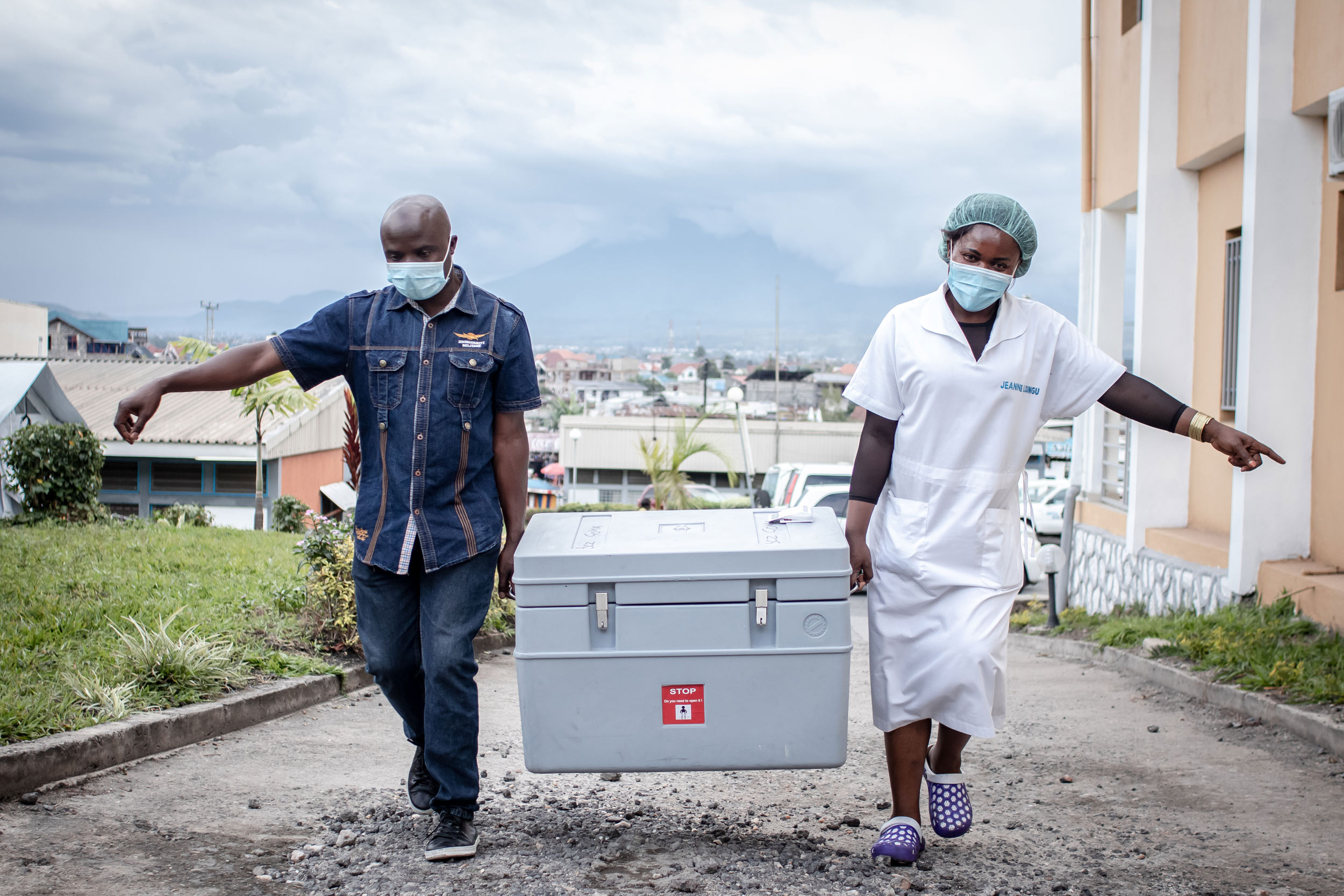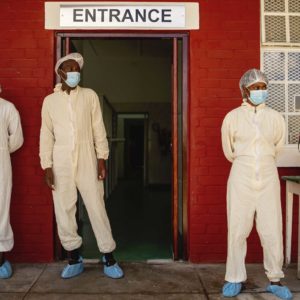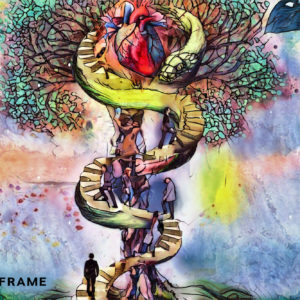Vaccine inequity persists in Africa
While the world discusses returning to normalcy, an entire continent is still struggling to secure first doses and has yet to surpass a 10% vaccination rate, with little concern from international …
Author:
24 November 2021

The vaccination rate in Africa stands at 9.8%. The continent of 54 countries and 780 million people is still struggling to reach double digits in vaccinating its population. The second-worst performer – Asia – has reached 60% vaccination rates. While there are discrepancies within the African continent – 65% of people vaccinated in Morocco, 27% in South Africa, 5.4% in Malawi and 0.13% in the Democratic Republic of Congo – the overall picture is worrisome. The rich countries and their big pharmaceutical companies have abandoned an entire continent. Following in their footsteps, companies from countries like India have also not stepped up to provide vaccines to African nations.
“Some of my colleagues have started to call it racism. Letting a whole continent have such limited access to vaccines smacks of nothing less,” said Mohga Kamal-Yanni, senior health policy adviser at The Peoples Vaccine Alliance.
Failing negotiations and pooling mechanism
Developments since last year indeed indicate racism and vaccine apartheid. The African Union, through the African Export-Import Bank, communicated last year that it is ready to buy vaccines and is awaiting offers from companies. Still, according to various sources, these negotiations failed despite efforts on the side of the African leadership. Even though some discussions with producers led to verbal commitments, in the end there was no final deal. All vaccine manufacturers prioritised the developed world, mainly Europe and North America.
The Africa Bureau of Presidents, chaired by South Africa’s President Cyril Ramaphosa, agreed that member states should target vaccinating 60% of their populations. Scientists at Africa Centres for Disease Control and Prevention suggested the same. The bureau established the African Vaccine Acquisition Task Team (Avatt) last year to procure the required number of vaccines collectively for all African nations. “It became pretty clear by December [2020] that the hope that we would all, as a global community, buy vaccines together through this structure called Covax was not being adhered to, especially by rich and powerful nations,” said Strive Masiyiwa, the chairperson of Avatt, in a press conference on 1 July 2021.
“We nevertheless engaged the donor community. They made it clear from the beginning that they would never go beyond 20% for our population in donor support, which meant that Africa would have to acquire the additional vaccines itself if it wanted to get to 60%,” added Masiyiwa. The task team was given the responsibility to raise the money to help the African nations acquire the vaccines. Avatt initiated talks with the World Bank as early as November 2020 and Masiyiwa pointed out that those discussions were successful. “What was less successful was just the availability of the vaccines. It really didn’t matter how much money a country had. They couldn’t buy the vaccines,” said Masiyiwa. He said the leaders of many African countries tried to connect with manufacturers and the chief executives of many companies, but they could not procure the vaccines.
“Even the Serum Institute of India was not forthcoming in supplying vaccines to the African nations,” said Fatima Hassan, founder of Health Justice Initiative. She said the profiteering of the pharmaceutical industry, backed by the governments of rich countries, has led to such a disastrous situation in Africa.
Related article:
A prominent example of how the world failed Africa is the backfiring of Covax in providing promised doses to developing countries. Covax is the vaccine pillar of ACT-Accelerator, an initiative of various stakeholders in the health sector, such as the Bill and Melinda Gates Foundation and Gavi, the Vaccine Alliance. Pharmaceutical companies were supposed to voluntarily pool their technology and manufactured vaccines in Covax, while rich nations were to pay for a given number of doses to be shipped to lower and middle-income countries. According to the original plan, Covax was supposed to procure enough doses of Covid-19 vaccines for countries to vaccinate up to 20% of their population in the long term – a goal that has been deemed as extremely under-ambitious from the very beginning of the initiative. However, companies never shared their technology, and not enough doses were pooled to reach even this threshold.
Covax has been able to sign up for 4.274 million doses so far through different sources. Some of these will be shipped to Africa. Compared with this, the United States alone has agreements for 3.210 million doses. The African Union has been able to sign agreements for only 510 million doses. There is no individual African country in the top 15 countries to have signed agreements for the requisite number of doses. The US has recently announced that it will donate one billion doses to Covax and some of it will be channelled to Africa. Details of this announcement are still awaited.
Local production as a way out
An effective way of addressing this inequality is local production of vaccines. Yet, the multinational pharmaceutical companies have thrashed all attempts to boost local production capacities. In an attempt to ramp up production of vaccines for the whole world, the World Health Organization has established the South Africa mRNA technology transfer hub. But Pfizer, which was among the first companies to develop an mRNA Covid-19 vaccine, did not share its technology. On the contrary, it bypassed this mechanism and signed a bilateral deal for vaccine production with the South African government. The agreement was shrouded in secrecy, but leaked information suggests that instead of transferring technology, Pfizer is only allowing for fill and finish. The active pharmaceutical ingredient will continue to be Pfizer’s monopoly.
“It is a very narrow and restrictive deal. African manufacturers can do a lot more,” said Zain Rizvi of Public Citizen, a US-based think-tank that has been following the business of big pharma for a long time, especially during the pandemic.
Another American company, Johnson & Johnson (J&J), also entered into an agreement with South Africa for vaccine production. However, it turned out that the company planned to export the doses produced in South Africa to Europe, instead of circulating them on the continent where they were manufactured. As a timely investigative story appeared in The New York Times newspaper, J&J took a step back in this plan and started supplying in Africa too. Still, the agreement they signed with the government of South Africa remains one to fill and finish, not one of technology transfer, which undermines the possibility of ramping up production.
Related article:
Pfizer and J&J have pledged notoriously low numbers of doses to meet the needs of developing countries. Pfizer has supplied only 40 million doses to Covax, less than 1% of the total doses procured by Covax so far. Janssen, a subsidiary of J&J, has given 500 million doses. J&J has also agreed to supply 400 million doses to the African Union to distribute across Africa. In comparison, Pfizer is supplying 2.404 billion doses to the European Commission and 314 million doses to Japan.
It is difficult to find detailed information on agreements between countries and companies. “Pfizer is known to sign a non-disclosure agreement even before starting negotiations to bar even the information about negotiations happening going out,” said Rizvi. However, going by the number of vaccinated people in Africa, it doesn’t seem like negotiations have led to more doses being made available.
Meanwhile, the companies have made enormous profit on vaccine production in recent months. Pfizer has made $31 billion (about R490 billion) in 2021 from its vaccine alone. J&J earned $502 million in sales from its Covid-19 vaccine in the third quarter, and it had already earned $264 million in the first six months of 2021.
This article was first published in Peoples Dispatch.


